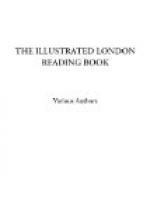Pompeii had suffered severely from an earthquake sixteen years before, but had been rebuilt and adorned with many a stately building, particularly a magnificent theatre, where thousands were assembled to see the gladiators when this tremendous visitation burst upon the devoted city, and buried it to a considerable depth with the fiery materials thrown from the crater. “Day was turned to night,” says a classic author, “and night into darkness; an inexpressible quantity of dust and ashes was poured out, deluging land, sea, and air, and burying two entire cities, Pompeii and Herculaneum, whilst the people were sitting in the theatre.”
[Illustration: POMPEII—APARTMENT IN “THE HOUSE OF THE HUNTER”]
Many parts of Pompeii have, at various times, been excavated, so as to allow visitors to examine the houses and streets; and in February, 1846, the house of the Hunter was finally cleared, as it appears in the Engraving. This is an interesting dwelling, and was very likely the residence of a man of wealth, fond of the chase. A painting on the right occupies one side of the large room, and here are represented wild animals, the lion chasing a bull, &c. The upper part of the house is raised, where stands a gaily-painted column—red and yellow in festoons; behind which, and over a doorway, is a fresco painting of a summer-house perhaps a representation of some country-seat of the proprietor, on either side are hunting-horns. The most beautiful painting in this room represents a Vulcan at his forge, assisted by three dusky, aged figures. In the niche of the outward room a small statue was found, in terra cotta (baked clay). The architecture of this house is singularly rich in decoration, and the paintings, particularly those of the birds and vases, very bright vivid.
[Illustration: PORTABLE KITCHEN, FOUND AT POMPEII.]
At this time, too, some very perfect skeletons were discovered in a house near the theatre, and near the hand of one of them were found thirty-seven pieces of silver and two gold coins; some of the former were attached to the handle of a key. The unhappy beings who were perished may have been the inmates of the dwelling. We know, from the account written by Pliny, that the young and active had plenty of time for escape, and this is the reason why so few skeletons have been found in Pompeii.
In a place excavated at the expense of the Empress of Russia was found a portable kitchen (represented above), made of iron, with two round holes for boiling pots. The tabular top received the fire for placing other utensils upon, and by a handle in the front it could be moved when necessary.
* * * * *




